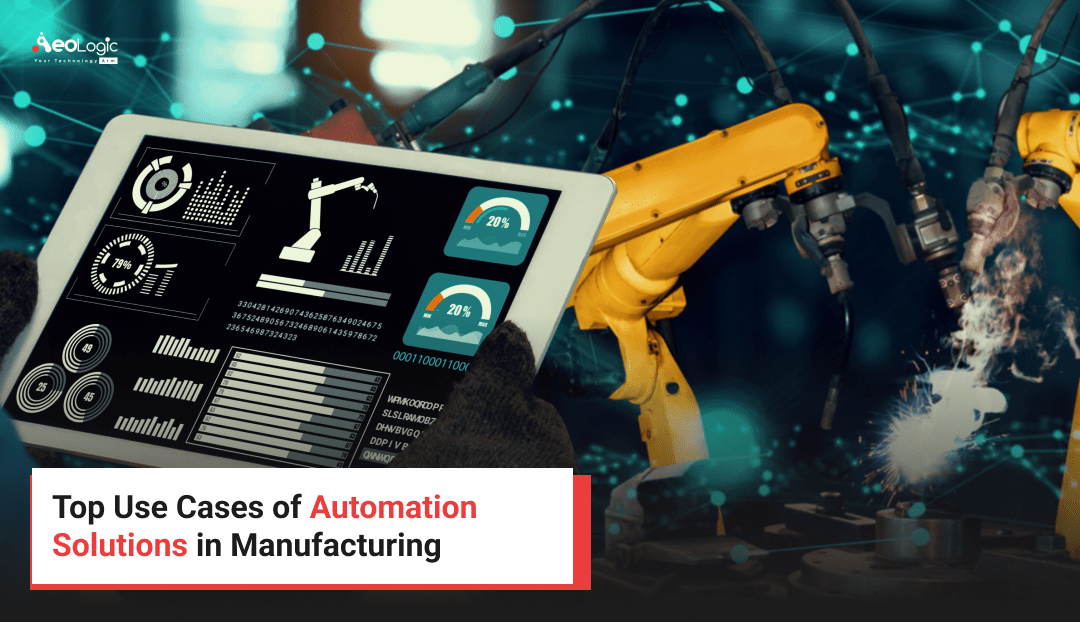Automation has eased the operations in various industries, and the manufacturing industry is one of the top-affected industries. The automation solutions can automate various tasks with extraordinary efficiency and pace that human employees cannot. There are various use cases of automation solutions in the manufacturing industry, but many businesses are not aware of this.
To increase the pace of productivity and fulfill the demands and supply, the implementation of automation solutions in the manufacturing industry is very necessary. We are going to provide brief information about the top use cases of automation solutions with other details, to spread awareness about the benefits of automation solutions.
In the manufacturing sector, automation is essential for increasing output, cutting expenses, and improving overall effectiveness. Manufacturers can boost production capacity, lower errors, and improve quality by automating repetitive processes. By removing risky jobs and minimizing human involvement in risky procedures, automation also improves worker safety.
There are various types of automation solutions that manufacturers can implement, like computer-integrated manufacturing, robotics, process automation, IT automation, robotic process automation, inventory management automation. Overall, the automation solutions bring an incredible way of performing operations that probably could not be possible manually.
Explore more: The Power of Manufacturing Automation Solutions
Global Market Analysis
The industrial automation software market size has grown rapidly in recent years. It will grow from $44.11 billion in 2024 to $48.89 billion in 2025 at a compound annual growth rate (CAGR) of 10.8%. It is expected to see rapid growth in the next few years. It will grow to $73.29 billion in 2029 at a compound annual growth rate (CAGR) of 10.6%.
A report shows that businesses that have implemented advanced automation technologies have experienced a 16% increase in productivity and a 12% reduction in operational costs.
The Role of Automation Solutions in Manufacturing
Automation solutions in manufacturing refer to the hardware and software solutions that are used to automate and streamline various processes or operations in the manufacturing industry to increase efficiency, productivity, and reduce unnecessary expenses.
Automation is generally achieved with the integration of AI and ML algorithms that are trained on natural language processing. The automation solutions can greatly improve the complexity of businesses across the various departments, which could let employees focus on more strategic development that automation cannot perform.
Also Read: How Automation is Transforming Manufacturing in India
Top Use Cases of Automation Solutions in Manufacturing
The use of AI in manufacturing is causing a paradigm shift, propelling the industry to unprecedented heights and efficiencies. Here are the top AI use cases in manufacturing mentioned below:
#1. Automation-Powered Visual Inspection System
Quality is one of the most important aspects in the manufacturing industry that can be improved with automation solutions. The automation-powered visual inspection system or solutions can continuously and automatically monitor the products in real time. Automation solutions can detect thousands of products at once, and any defect finding results in a warning to the system to make that right.
#2. Digital Twins For Process Automation
Digital twins are a replica of entire manufacturing processes and operations. This helps manufacturers to test the strategy in a real-world environment without harming the actual aspects. The digital twins automate the data collection, analysis, and simulation that help manufacturers to make improvements in the required areas.
#3. AI-Driven Predictive Maintenance
AI is a part of automation that provides solutions to enhance predictive maintenance. The AI algorithm can analyze the data on the performance of equipment to detect patterns. If any risk or errors are found in the pattern, they immediately inform the manufacturers that enabling them to take necessary precautions. This reduces the downtime of equipment and also saves the cost of maintenance.
By integrating a mobile application for a computerized maintenance management system (CMMS), this predictive maintenance strategy can be further enhanced. When implementing a mobile application for a property management system (CMMS), it is simpler to access real-time data and analytics while on the go. This allows maintenance teams to respond more promptly and make more informed decisions by providing them with instant updates and alerts.
#4. Supply Chain Management
RPA or robotic process automation solutions are one of the top examples of automation solutions that can be used to enhance the supply chain management in manufacturing. The RPA can integrate with various other systems like ERP, CRM, SCM, etc, to monitor and track the operations in the supply chain, like inventory levels, trigger reorder processes, and reconcile shipments with purchase orders. This automatically triggers a warning if the inventory stock level goes down, and increases accuracy too.
#5. 3D Printing and AI for Custom Manufacturing
Customized objects may be produced on demand thanks to the combination of 3D printing and AI. To create optimum designs that can be quickly created utilizing additive manufacturing processes, AI algorithms automatically examine customer demands, performance requirements, and material qualities that can be used to design the products that best suit the customer’s demands. 
#6. Administering Warehouse
AI in manufacturing is also changing the way warehouses are managed by making it more efficient with smart technology and data insights. The introduction of AI-powered solutions and machine learning in manufacturing has changed the way stores work, making them more accurate, efficient, and cost-effective.
Keeping track of inventory is a big use case for AI in industrial warehouses. AI algorithms can correctly predict patterns of demand by looking at past sales data, current stock levels, and market trends. This lets warehouses keep the right amount of goods on hand, which lowers their carrying costs and makes sure that products are always available.
#7. Upgrades Assembly Line
AI for manufacturing is a key part of improving assembly lines, which makes production processes more accurate, more efficient, and more flexible. Machine learning algorithms make work easier, cut down on downtime, and allow for planned maintenance by looking at past performance measures and real-time sensor data. In manufacturing, AI-powered computer vision systems can find flaws or other oddities in products to make sure they are of good quality.
Intelligent automation cuts down on waste and makes better use of resources by changing production factors in response to changes in demand. By constantly learning and adapting, AI turns assembly lines into data-driven, flexible spaces that can increase output, lower costs, and maintain high standards in the production process.
Looking for? Factory Automation Solutions
How Much Does It Cost to Implement Automation Solutions in Manufacturing?
The factors like manufacturing business infrastructure complexity, scope of automation, level of automation, process types to automate, etc, can affect the overall cost of automation solutions. A simple job scheduler automation solution might cost under $10,000, while a fully automated assembly line can exceed $500,000.
Robotic process automation (RPA) can range from $10,000 to $250,000, with individual bots costing between $5,000 and $15,000. Here are a few specific cost examples of automation solutions mentioned below.
-
- Robotic Process Automation (RPA): Individual bots may cost between $5,000 and $15,000.
-
- Industrial AI Systems: Can range from $100,000 to over $1 million, depending on complexity.
-
- Industrial Vision Systems: Can range from $25,000 to $250,000.
-
- Automated Test Equipment (ATE): Costs vary depending on the specific application and complexity.
-
- Robotic Assembly Lines: Can range from hundreds of thousands to millions of dollars, depending on the number and complexity of robots.
-
- Partial Automation: Might cost around $200,000.
-
- Fully Automated Line: Can exceed $500,000.
| Automation Solution | Cost Range | Notes |
|---|---|---|
| Robotic Process Automation (RPA) – Individual bots | $5,000 – $15,000 | Cost per bot |
| Industrial AI Systems | $100,000 – $1,000,000 | Depends on complexity |
| Industrial Vision Systems | $25,000 – $250,000 | Depends on system type |
| Automated Test Equipment (ATE) | Varies (depending on application and complexity) | Varies based on application |
| Robotic Assembly Lines | Hundreds of thousands to millions | Cost depends on number and complexity of robots |
| Partial Automation | $200,000 | Estimated cost |
| Fully Automated Line | Exceeds $500,000 | Estimated cost |
Also Read: The Benefits of Using Automation in Manufacturing
Real-World Examples of Automation Solutions
There are various real-world examples mentioned of industries or businesses that have implemented the automation solutions to enhance their operational efficiency. Here are a few mentioned below.
-
- Audi is one of the leading car manufacturing companies that has implemented inspection solutions to detect defects in cars while manufacturing. This helps them to maintain their reputation.
-
- Siemens’ gas turbine manufacturing facility in Berlin implemented a comprehensive digital twin system in 2024 using their MindSphere IoT platform and Azure Digital Twins.
-
- ArcelorMittal implemented an AI-driven predictive maintenance system across its European facilities. This helps to monitor equipment health in real time to enable predictive maintenance.
-
- Samsung Electronics, this year, implemented a blockchain-based traceability system for its semiconductor division using Hyperledger Fabric. This enables us to track the whole supply chain to understand the supplier and reduce audit time.
So, after various discussions and passing through various information like use cases, pricing, and real-world examples of automation solutions in manufacturing, it can be concluded that the automation solutions are the innovation that the manufacturing industry lacked for many years.
These solutions are revolutionizing the manufacturing industry to make it reach a level of success that was never imagined before.
Communicate with us for the best guidance regarding manufacturing automation solutions. For businesses aiming for the stars, integrating manufacturing automation solutions is the rocket fuel they need. It’s not just the future; it’s the present.
The time to harness its eventuality is now, hence assuring a prosperous and innovative journey ahead.
Also Read: What Are The Examples of IoT Solutions in Manufacturing?
FAQs
What are the most common use cases of automation in manufacturing?
Automation in manufacturing is utilized across several areas to improve efficiency and productivity. Common use cases include robotic process automation (RPA) for assembly lines, automated material handling systems, quality control through machine vision, and predictive maintenance to minimize downtime. Automation is also heavily used in packaging, testing, and inventory management.
How can automation solutions improve efficiency in manufacturing industries?
Automation solutions enhance manufacturing efficiency by streamlining processes, reducing human error, and accelerating production timelines. Automated systems can perform repetitive tasks faster and more accurately than humans, ensuring consistent product quality and minimizing waste. Additionally, automation enables real-time data collection, allowing manufacturers to make informed decisions quickly and optimize operations.
What benefits does automation bring to production lines in manufacturing?
Automation brings several key benefits to production lines, including increased speed, precision, and flexibility. Automated systems can operate 24/7, maximizing production output while reducing the need for manual labor. This reduces operational costs, improves product consistency, and minimizes the chances of defects. Automation also enhances worker safety by taking over dangerous or physically demanding tasks.
How does automation in manufacturing reduce operational costs?
Automation reduces operational costs by improving efficiency, reducing labor expenses, and minimizing waste. Automated machines and robots can work continuously without breaks, leading to higher output at a lower cost. Additionally, automation solutions such as predictive maintenance prevent costly breakdowns, while improved process control helps reduce material waste and energy consumption.
What are the top automation technologies transforming the manufacturing sector?
Key automation technologies transforming the manufacturing sector include robotics, industrial IoT (Internet of Things), artificial intelligence (AI), machine learning (ML), and machine vision. These technologies enable more intelligent and adaptive systems that can learn from data, make decisions in real-time, and optimize production processes. Additionally, advancements in 3D printing and collaborative robots (cobots) are further enhancing manufacturing automation capabilities.

I’m Deepika Pandey, an SEO strategist and content writer with 6+ years of experience. I create SEO-friendly content that drives traffic and engages readers. I combine data insights with creativity to help businesses grow their online presence effectively.






